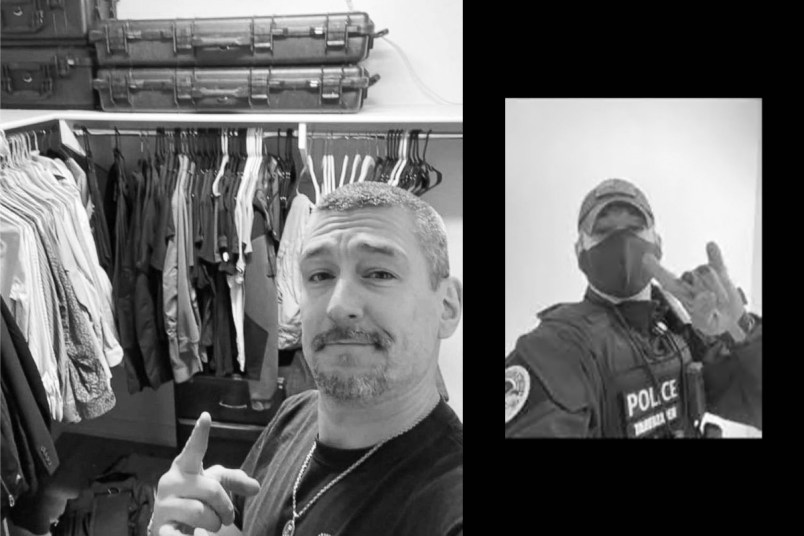D.C. federal prosecutors on Friday outlined their arguments for why two men charged with impersonating Homeland Security agents should be detained pending trial, again without providing much explanation of who might have directed what the government described as a scheme to “infiltrate networks of federal law enforcement officers.”
The men are Arian Taherzadeh and Haider Ali, arrested on Wednesday after FBI agents stormed the luxury Navy Yard residential complex where they had rented five apartments. The pair have each been charged so far with impersonating federal officers, though Assistant U.S. Attorney Joshua Rothstein said on Thursday that further charges related to firearms possession may be forthcoming.
Prosecutors have described a mind-boggling scheme that began in February 2020, in which the two offered free apartments to Secret Service agents as well as other gifts, including a $2,000 AR-15 style rifle. The pair allegedly masqueraded as heavily armed Homeland Security agents on a run of perpetual undercover operations, gaining the trust of at least one agent on First Lady Jill Biden’s security detail.
At a Friday afternoon hearing, Rothstein struggled to convey to Magistrate Judge G. Michael Harvey that while Taherzadeh and Ali were braggants and apparently in deep arrears, the allegations were grave.
“This is not just two people dressing up for Halloween, your honor, this is very serious,” Rothstein said.
Harvey peppered Rothstein with questions, including where one of the defendants was born, the extent to which stamps in Ali’s passport could be trusted to verify travel to Pakistan and Iran, and how much money the two spent on the operation.
TPM reported on Friday that the duo had not paid for the five apartments they rented in Navy Yard.
“We believe that they did not actually pay for all those months of rent,” Rothstein said. He added that giving a federal agent a “thing of value” creates a “compromising situation” regardless of whether or not you pay for it.
Federal prosecutors obtained grand jury subpoenas to run down the pair’s finances, Rothstein told the judge, while saying that Taherzadeh had told investigators that he did not start off by claiming that he was a DHS agent, but rather that he was associated with the department.
He allegedly then started to claim, falsely, that he was a DHS agent.
“He made a statement to the effect of, that he started lying and it got away from him,” Rothstein said.
“These are individuals that had a two-year scheme to deceive members of law enforcement,” Rothstein added. “So we need to run all of this to ground.”
In a Friday court filing, prosecutors said that the pair “compromised” Secret Service agents, though it did not explain how, or to what end.
FBI agents did, the filing said, uncover what appeared to be extensive surveillance equipment during a search of the duo’s apartments. That purportedly included “a drone, antennae, hard drives, and hard drive copying equipment; tools to manufacture identities, including a machine to create Personal Identification Verification (PIV) cards and passport photographs.”
Taherzadeh, who prosecutors said did most of the talking to Secret Service agents, spoke at length with investigators after his arrest, the filing said, allegedly admitting to posing as a DHS agent.
He allegedly told federal agents that it was Ali who obtained “electronic access codes” to residents of the apartment complex.
“Taherzadeh further stated that Ali was the individual that funded most of their day-to-day operation but Taherzadeh did not know the source of the funds,” the filing read.
The government did not go so far as to state what the aim of the operation was, or what the ultimate source of the funds may have been.
Citing Ali’s travel records, prosecutors argued that Ali may have had some unspecified ties to the Middle East. Stamps in his passport showed travel in recent years to Pakistan, Iran, Iraq, and Egypt.
Ali and Taherzadeh appear to have bragged to most in their immediate vicinity about their dubious yet cool government ties. In Ali’s case, the government said, the list of supposed relationships appears to have included claims of ties to the ISI — Pakistan’s intelligence agency.
Prosecutors said that Ali told one witness about the supposed ISI ties, without specifying exactly what he claimed.
“Until this claim can be further investigated, and given the nature of Ali’s conduct, specifically impersonating federal law enforcement in order to ingratiate himself with and infiltrate networks of federal law enforcement officers and other federal employees, his claim must be taken literally and seriously,” the filing reads.
Read the filing here:






